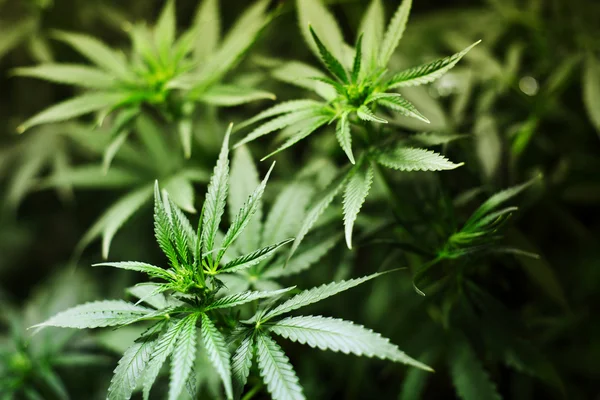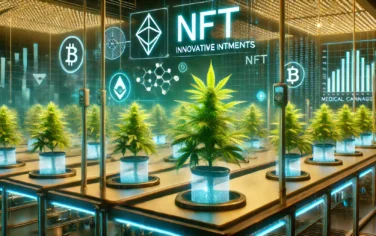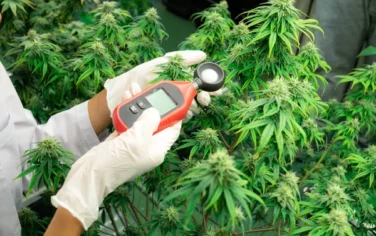What’s behind the incredible popularity of cannabis-infused products?

November 21, 2024
In recent years, a cannabis extract known as CBD (cannabidiol) has been booming in the US. It can be found everywhere—from specialty stores to ordinary supermarkets. The range of CBD products is impressive: vape oils, pain relief creams, patches, sweets (gummy bears, sour snakes, rainbow candies—you name it), capsules, and dietary supplements.
CBD is so widespread that it seems there is no place where it cannot be purchased and no disease it cannot potentially treat. Users claim they take it for everything from muscle pains and anxiety to arthritis, epilepsy, and even post-traumatic stress disorder. There’s even CBD oil for pets, like bacon-flavored for dogs.
According to research by the Brightfield Group, the CBD market is expected to reach $5.7 billion next year and $22 billion by 2022. The industry’s largest player, Charlotte’s Web Holdings, grew by 172% in 2016-17 and is on track to earn $89 million in 2018.
This controversial yet promising sector is attracting the attention of the investment world and interest from unexpected companies. Giant Coca-Cola has stated it is “closely watching the growth of non-psychoactive CBD as an ingredient in functional wellness beverages worldwide.”
Millennials were the first to start buying CBD products after their legalization in several states. Interest is high among people over 30, drops among Generation X, but rises again among baby boomers, who purchase CBD products for age-related ailments such as arthritis or chronic pain. The consumer base is roughly equal between men and women.
However, buyers should be cautious. While CBD products are widely available in the US, purchasing them is nearly always against the law, with one specific exception. The issue lies in the conflict between federal and state laws, and confusion between hemp and marijuana.
CBD and the intoxicating THC are the two main cannabis extracts. Industrial hemp contains less than 0.3% THC but can be high in CBD. Marijuana, however, is typically cultivated for its high THC content. Despite these differences, both types of cannabis were classified as schedule 1 drugs in the US in the 1970s, the same category as heroin and cocaine.
In states where it is permitted, THC products must be cultivated, processed, and sold only by state-licensed companies. CBD, on the other hand, can be bought anywhere from supermarkets to gas stations.
Yet CBD remains in a legal gray area. Many retailers believe that as long as they comply with state regulations and do not ship their products across state lines (which would constitute drug trafficking), then federal law enforcement like the Drug Enforcement Administration (DEA) will adopt a hands-off approach. However, the DEA has confirmed that CBD in any form, even from hemp, remains an illegal drug. The only exception is a drug called Epidiolex, which contains 98% CBD and has been approved by the FDA for treating childhood epilepsy.
Regarding the hype over cannabis stocks, Forbes called it “ridiculous” and noted that investing in Apple was still a better choice than marijuana.
There are preliminary, mostly anecdotal, indications that CBD may have anti-anxiety, anti-inflammatory, and even antipsychotic effects. Small studies have shown promising results in treating schizophrenia and inflammatory bowel diseases like Crohn’s disease. But, as Dr. Grant warns, the science has yet to accumulate sufficient data on CBD’s effectiveness.
Regarding “functional wellness beverages” with added CBD, their benefits are as unproven as many dietary supplements. “Valium also helps with anxiety. Maybe we should add a touch of that to Coke to make people relax?” jokes Grant.
He believes that the first step is to resolve the contradictions between local and federal laws regarding CBD’s status. Then, wait for convincing scientific data to provide recommendations to consumers.
So, despite the huge interest in CBD, many questions about its legal status, safety, and effectiveness remain open. Consumers and investors should approach this trendy, yet controversial trend with caution. Until science and law clarify the situation, CBD products will remain a risky and ambiguous area.
Other News

Introduction: A New Era of Investment Opportunities 2025 ushers in unprecedented opportunities for investors in the rapidly growing medical cannabis sector. According to Grand View Research, the global medical cannabis market is on the brink of historic growth, with a projected value of $346.2 billion by 2030. A steady annual growth rate of 14.9% makes […]

About the Transition to USDC As of December 30, 2024, Tetra Farm has fully transitioned from USDT (Tether) to USDC (USD Coin). This change applies to all financial operations within the project, including: Purchasing NFTs Profit distribution to project participants All internal transactions Reasons for Transitioning to USDC Compliance with New EU Regulations With the […]

Introduction Laura Stewart, a professor at the University of Northern Colorado, has been studying the impact of physical exercise on immunity for over 20 years. However, her interests have shifted towards the relationship between cannabidiol (CBD) and immune system function in the last decade. The scientist is captivated by this topic, as she has discovered […]

